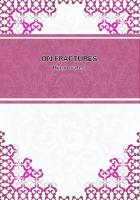"This Signore Luca Barboni was either the assumed name of the personage in question, or the medium of communication between that individual and Miriam. Now, under such a government as that of Rome, it is obvious that Miriam's privacy and isolated life could only be maintained through the connivance and support of some influential person connected with the administration of affairs. Free and self-controlled as she appeared, her every movement was watched and investigated far more thoroughly by the priestly rulers than by her dearest friends.
"Miriam, if I mistake not, had a purpose to withdraw herself from this irksome scrutiny, and to seek real obscurity in another land; and the packet, to be delivered long after her departure, contained a reference to this design, besides certain family documents, which were to be imparted to her relative as from one dead and gone.""Yes, it is clear as a London fog," I remarked. "On this head no further elucidation can be desired. But when Hilda went quietly to deliver the packet, why did she so mysteriously vanish?""You must recollect," replied Kenyon, with a glance of friendly commiseration at my obtuseness," that Miriam had utterly disappeared, leaving no trace by which her whereabouts could be known. In the meantime, the municipal authorities had become aware of the murder of the Capuchin; and from many preceding circumstances, such as his persecution of Miriam, they must have seen an obvious connection between herself and that tragical event. Furthermore, there is reason to believe that Miriam was suspected of connection with some plot, or political intrigue, of which there may have been tokens in the packet.
And when Hilda appeared as the bearer of this missive, it was really quite a matter of course, under a despotic government, that she should be detained.""Ah, quite a matter of course, as you say," answered I. "How excessively stupid in me not to have seen it sooner! But there are other riddles. On the night of the extinction of the lamp, you met Donatello, in a penitent's garb, and afterwards saw and spoke to Miriam, in a coach, with a gem glowing on her bosom. What was the business of these two guilty ones in Rome, and who was Miriam's companion?""Who!" repeated Kenyon, "why, her official relative, to be sure; and as to their business, Donatello's still gnawing remorse had brought him hitherward, in spite of Miriam's entreaties, and kept him lingering in the neighborhood of Rome, with the ultimate purpose of delivering himself up to justice. Hilda's disappearance, which took place the day before, was known to them through a secret channel, and had brought them into the city, where Miriam, as I surmise, began to make arrangements, even then, for that sad frolic of the Carnival.""And where was Hilda all that dreary time between?" inquired I.
"Where were you, Hilda?" asked Kenyon, smiling.
Hilda threw her eyes on all sides, and seeing that there was not even a bird of the air to fly away with the secret, nor any human being nearer than the loiterers by the obelisk in the piazza below, she told us about her mysterious abode.
"I was a prisoner in the Convent of the Sacre Coeur, in the Trinita de Monte," said she," but in such kindly custody of pious maidens, and watched over by such a dear old priest, that--had it not been for one or two disturbing recollections, and also because I am a daughter of the Puritans I could willingly have dwelt there forever.
"My entanglement with Miriam's misfortunes, and the good abbate's mistaken hope of a proselyte, seem to me a sufficient clew to the whole mystery.""The atmosphere is getting delightfully lucid," observed I, "but there are one or two things that still puzzle me. Could you tell me--and it shall be kept a profound secret, I assure you what were Miriam's real name and rank, and precisely the nature of the troubles that led to all those direful consequences?""Is it possible that you need an answer to those questions?" exclaimed Kenyon, with an aspect of vast surprise. "Have you not even surmised Miriam's name? Think awhile, and you will assuredly remember it. If not, I congratulate you most sincerely; for it indicates that your feelings have never been harrowed by one of the most dreadful and mysterious events that have occurred within the present century!""Well," resumed I, after an interval of deep consideration, "I have but few things more to ask. Where, at this moment, is Donatello?""The Castle of Saint Angelo," said Kenyon sadly, turning his face towards that sepulchral fortress, "is no longer a prison; but there are others which have dungeons as deep, and in one of them, I fear, lies our poor Faun.""And why, then, is Miriam at large?" I asked.
"Call it cruelty if you like, not mercy," answered Kenyon. "But, after all, her crime lay merely in a glance. She did no murder!""Only one question more," said I, with intense earnestness. "Did Donatello's ears resemble those of the Faun of Praxiteles?""I know, but may not tell," replied Kenyon, smiling mysteriously. "On that point, at all events, there shall be not one word of explanation."Leamington, March 14, 1860.















